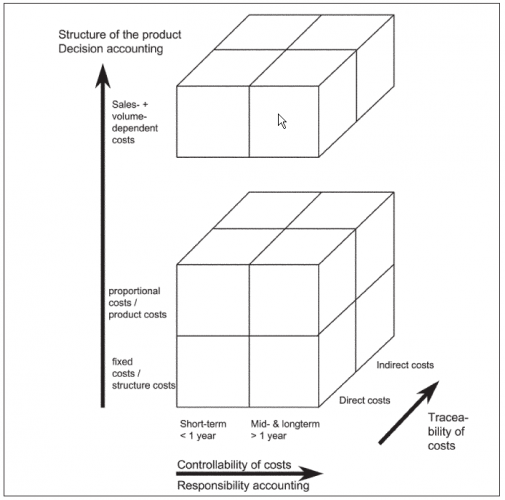Cost cube
From ControllingWiki
Contents
IGC-DEFINITION (abbreviated)
Cost cube / Kostenwürfel
If we want to analyse the management’s responsibility for costs and revenues and prepare the necessary information for taking cost-related decisions, we first must present the different cost aspects in the clearest possible way, showing how they are inter-linked, and second make consistent use of clearly defined concepts. The cost cube is not a new theory but rather a model for explaining cost behaviour, which has proven itself very useful in practice. It presents the cost aspects in three dimensions:
- Product costs / structure costs (vertical axis of the cube):
For the purposes of decision accounting it is important to differentiate between costs caused by the nature of the products on one hand – and costs caused by the structure of the business on the other hand. Product costs (proportional costs) are the direct and causal consequence of producing a product-item or a service.
In contrast structure costs are defined by a business’s capacity and organisational structure. These are costs, in other words, that are not directly dependent on output but are determined by decisions over the business’s capability to produce goods and services. These structure costs express the necessary effort to ensure that goods and services can be produced at all.
- Controllability in the short or middle term (horizontal axis of the cube):
“Who has the competence to influence costs as they arise and in what time-frame can the costs be changed?” These are the questions asked by responsibility accounting. This dimension shows, which cost amounts can be altered in what time-frame.
- Direct and indirect costs (third dimension in the cube):
Whether it is a matter of direct or indirect costs depends on the object in question. The salary of the employee in the accounts receivable department (structure costs, controllable in the middle term) belongs to the direct costs of the accounting cost center, but to the indirect overhead costs of products. Material costs for highly refined parts (product costs, controllable in the long term, because only one supplier is available) are direct costs of the manufactured product.
The same three-dimensional way of thinking applies to the costs dependent on revenue. Commissions, deductions from revenue, freight charges, those parts of the distribution costs dependent on orders etc. – All these costs are no longer depend on the volume produced but on sales-mix, sales volume and revenue, which means they need to be represented by a detached cube.
from: IGC-Controller-Wörterbuch, International Group of Controlling (Hrsg.)
Source
World Book Night: Millions of Free Books Donated
A young woman is jumping up and down in front of the New York Public Library wearing a sandwich sign that says, "Hate Reading? Talk To Me!" Shes waving around several copies of "The Glass Castle" by Jeannette Walls, eager to get them off her hands.Men and women in suits breeze by, but some passersby are curious about the spectacle. If you were roaming the streets of New York City or London last night you may have encountered a similar scene: Zealous readers handing out award-winning novels by the boxful.
[World Book Night: Millions of Free Books Donated]
[GoodvilleNews.com - good, positive news, inspirational stories, articles]
Student Goes From Homeless to Harvard
Despite being abandoned to homelessness by her parents, Dawn Loggins worked as a high school custodian by day and studied hard by night to become the first person from her school to ever be admitted to Harvard.
[Student Goes From Homeless to Harvard]
[GoodvilleNews.com - good, positive news, inspirational stories, articles]
Use Your Talents Give More Receive More
When I stand before God at the end of my life, I would hope that I would not have a single bit of talent left, and could say, I used everything you gave me.Erma Bombeck
[Use Your Talents Give More Receive More]
[GoodvilleNews.com - good, positive news, inspirational stories, articles]
10 Ways to Love Where You Live
Community is not just for extroverts.For thousands of years, our ancestors lived in barrios, hamlets, neighborhoods, and villages. Yet in the time since our parents and grandparents were young, privacy has become so valued that many neighborhoods are not much more than houses in proximity.
[10 Ways to Love Where You Live]
[GoodvilleNews.com - good, positive news, inspirational stories, articles]
Little Things You Can Do to Make the World a Lot Nicer
A few years ago, Debbie Tenzer was feeling overwhelmed by all the crises in the news. But rather than give in to despair, she thought, Maybe I cant solve our big problems, but I know I can do something.
[Little Things You Can Do to Make the World a Lot Nicer]
[GoodvilleNews.com - good, positive news, inspirational stories, articles]

